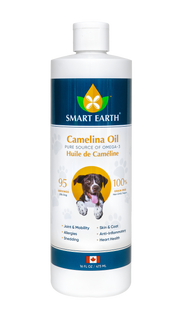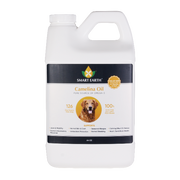No Products in the Cart
Written by: Sarah Seward-Langdon
Published on: 05/13/2024
Did you know that nutrition plays a crucial role in your dog’s joint health? Although some pet owners overlook the importance of an appropriate diet, it’s key to ensuring your dog’s long, healthy life.
As your dog ages, they’ll be prone to joint problems—just like us humans! To put it into perspective, approximately 25% of dogs of all ages suffer from osteoarthritis. Otherwise known as Degenerative Joint Disease (DJD), this joint ailment takes the lead as the most prevalent joint disease in dogs.
In this blog, we’ll examine the significant impact that diet can have on a dog's joint health, the benefits of specific nutrients, and how to choose the right food for your furry friend.
Joints are complex structures that require an intricate balance of strength, flexibility, and lubrication to function properly. They are constantly under stress from everyday activities, which means they need proper nutrients to maintain their health.
The cartilage in the joints, which prevents bones from rubbing together, can degrade over time or from stress, leading to conditions such as osteoarthritis.
Both of these are key components of cartilage and play a significant role in the development and maintenance of joint health. While the body can produce them, you should consider giving your dog dietary supplementation to help them. This is especially true during periods of high stress on their joints; for example, when dogs are older or if your pup is an active, working breed.
Dog food that includes these compounds can support the natural turnover and daily rejuvenation of cartilage.
Ingredients and supplements like New Zealand green mussels, camelina oil, and canned sardines are rich in omega-3 fatty acids. Making sure your dog gets enough essential fatty acids is essential for reducing inflammation and promoting joint health. Omegas help nourish the joints and improve their function.
Vitamins E and C, along with minerals like zinc, copper, and manganese, act as antioxidants and are crucial for protecting joint tissues from oxidative damage.
Osteoarthritis is more prevalent in dogs who are older or overweight. Research indicates a strong link between obesity and increased joint problems:
Weight Management: A lean diet helps prevent the onset of joint issues by reducing stress on the joints. Foods low in calories but rich in nutrients are essential. It’s important to note obese dogs not only need to carry more weight, but because of their condition they also produce more inflammatory hormones that do not improve the situation.
Exercise and Diet: Regular, low-impact exercise combined with a nutritious diet can significantly reduce the risk of joint problems.
What’s the best way to support your dog so that they can avoid serious joint issues for as long as possible? Feeding them a balanced diet. It must be rich in essential nutrients like proteins, carbohydrates, and fats, along with specific supplements like glucosamine and chondroitin, which can improve joint health.
If your dog is older, more active, or a large breed, you may worry about their joints more. That’s understandable! If that’s the case, you can start feeding your pup specific foods and supplements. As we mentioned before, foods rich in omega-3 fatty acids, such as fish oils or plant based oil like camelina can directly benefit dogs with joint issues.
Before changing your dog’s diet to add anti-inflammatory foods or helpful supplements, remember to discuss your plans with your vet. They’ll be able to help you with suggestions and diet tips.
✅ Single ingredient, 100% pure Camelina Oil.
✅ Non-GMO
✅ Ideal balance of Omega-3 compared to other products, like soybean oil.
✅ Canadian produced and operated.
✅ Single ingredient, 100% pure Camelina Oil.
✅ Non-GMO
✅ Ideal balance of Omega-3 compared to other products, like soybean oil.
✅ Canadian produced and operated.
When choosing your dog’s food, here are some things to remember:
Check the Labels: Look for dog foods that specify the inclusion of joint-supporting nutrients such as glucosamine and chondroitin.
Consult Your Veterinarian: Your vet can provide recommendations based on your dog’s specific health needs and can prescribe diets that support joint health.
Quality and Reputation of the Brand: Select a dog food brand that is known for high-quality ingredients and adherence to pet food regulations.
Most importantly, remember to think of your dog as a unique being. What works for one dog may not work for your dog. It’s ongoing hardwork to find out the best dietary solutions for your precious pup!
While no diet can prevent joint issues entirely, especially as dogs age, a proactive approach that integrates proper nutrition can significantly alleviate symptoms and improve quality of life. Join that with other essentials like exercise and mental stimulation, and you’ll have one happy pup!
It’s your responsibility as a pet parent to make sure your dog maintains a healthy weight and gets the nutrients they need for optimal joint health. You’re helping keep them active and happy for years to come. Remember, always consider your dog's overall diet and consult with your veterinarian to tailor a feeding plan that best supports their joint health.
✅ Single ingredient, 100% pure Camelina Oil.
✅ Non-GMO
✅ Ideal balance of Omega-3 compared to other products, like soybean oil.
✅ Canadian produced and operated.
✅ Single ingredient, 100% pure Camelina Oil.
✅ Non-GMO
✅ Ideal balance of Omega-3 compared to other products, like soybean oil.
✅ Canadian produced and operated.
Sarah is a marketing specialist with a passion for anything creative! Her openness to working across industries and job opportunities has allowed her to gain enormous amounts of experience in graphic design, video production, and written content creation. Animals have a special place in her heart as she grew up with cats and now owns her own Alaskan Malamute. She has spent the last couple of years in Vancouver working with different companies within the pet industry and gained valuable knowledge about the ins and outs of the (alternative) pet food industry, supplementation, and various training methods. When she’s not digitally creating content for pet lovers to consume, she’s out eating great food, dancing at drop-in classes, or exploring the beautiful Canadian scenery with her fur-child Miso.

